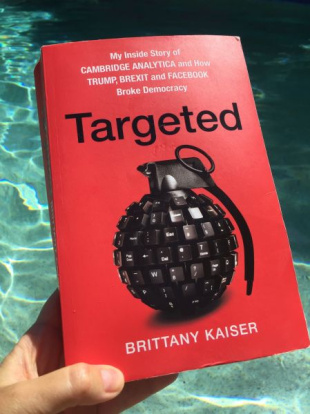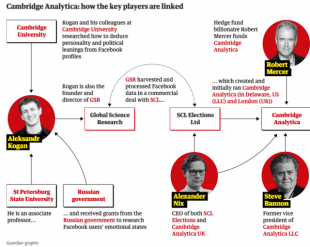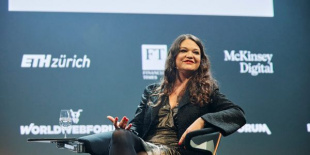News
- 04 June 2020
My favourite book of the year so far: Targeted: My Inside Story of Cambridge Analytica and How Trump, BREXIT, and Facebook Broke Democracy by Brittany Kaiser (who you may recognise from the Netflix documentary, The Great Hack) and who runs DATA (Digital Asset Trade Association) and Own Your Data. This book combines some of my favourite things: technology, psychology, politics, and the consequences for society when these things are combined by people who don't have the best motives.
My favourite book of the year so far: Targeted: My Inside Story of Cambridge Analytica and How Trump, BREXIT, and Facebook Broke Democracy by Brittany Kaiser (who you may recognise from the Netflix documentary, The Great Hack) and who runs DATA (Digital Asset Trade Association) and Own Your Data. This book combines some of my favourite things: technology, psychology, politics, and the consequences for society when these things are combined by people who don't have the best motives.
This is a part-memoir, part-expose centred on the time Brittany was the director of Cambridge Analytica (under the SCL Group). You may know about Cambridge Analytica for the way they used a third party Facebook app, thisisyourdigitallife, to get 570 points of data on over 50 million users (and 570 data points on all their friends) based on their psychological OCEAN scores (you can find your scores on Openness, Conscientiousness, Extraversion, Agreeableness, and Neuroticism here).
These psychological personality profiles (originally used only for academic use) were able to be linked to other data shared on Facebook and offline then used to micro-target Facebook users to personalised adverts in a way that influenced them to vote (for Donald Trump) or not vote (for Hillary Clinton) in the 2016 elections. Brittany explains the reason WHY such micro-targeting ads worked so well.
This personalised advertising campaign on Facebook using personality profiles and linked to Facebook data was funded by Republican hedgefund billionaire Robert Mercer and his daughter Rebekah, who worked closely with Steve Bannon (Trump's key adviser) who supplies the right-wing leaning Breitbart office where a lot of their meetings took place.
Brittany is impressive and writes well. She spent a lot of her career working for progressive political campaigns and human rights organizations, and she has degrees in human rights law and international relations. She worked for Cambridge Analytica in the UK and the U.S. for three and a half years before blowing the whistle on their unethical business practices in the global data industry. Brittany believes that data rights are human rights, therefore is focused on using her expertise to advance legislative reform to protect the rights of individuals to control their own digital assets, such as personal data and blockchain tokens.
Here are some quotes from the book:
The bigger a data set that you have, the more polls, the more surveys that you have that people undertake, the more accurate your models are going to be. That's just a fact of data science.
In order to create predictive algorithms, you need to have a training set. So, that training set is created through our quantitative surveys. Those surveys need to include either basic market research questions or basic political polling questions, which might be added to get your opinion on a brand, or an issue, or a candidate.
The work the two teams had done was technically fantastic, but in two days, I had seen nothing less than the darkness I knew existed in politics - the appeals to our basest instincts, the fearmongering, the manipulation, the way we turned against one another, and how I had had no idea... This technology had seemed so benign in the confines of a PowerPoint presentation, and now I could see it had ruined us.
The CA team has studied what it took to "convert" and audience on a given platform. Online, the average number of impressions it took was five to seven, meaning if a viewer saw an ad five to seven times, they were highly likely to click through to the material we wanted them to see
SCL wasn't just about psychographics. It was about gathering information at a number of different levels, not just demographics or situational information, but also sociodynamics e.g., what groups they belonged to, what are their locus of control, whether they believe they control their own destiny. What social networks do they belong to? What power structures? What common enemies do they have and how can we use that to drive behaviour? We look at culture and beliefs and religiosity. But you also ask questions about the individual. We're not interested in what you think about the president. We're interested in you. What are your buttons? We believe that people change people. Not messages. We want the people to do the talking for us.
CA had the capability of inoculating voters with a small dose of bad news well in advance, so that they would become immune to it when it mattered most, on Election Day.
(Image from WorldWebForum)
Brittany suggests the following to protect ourselves:
- Become digitally literate
- Engage with legislators
- Help companies make ethical choices
- Ask regulators to hole abuses of power to account
- Make ethical decisions in your own digital life
READ the interview (mentioned in the book) Former Cambridge Analytica exec says she wants lies to stop
READ about when 100, 000 documents were leaked showing the global manipulation from Cambridge Analytica
WATCH The Great Hack trailer:
WATCH this interview with Brittany where she speaks about data privacy and rights:
Leigh-Chantelle is an International Speaker & Consultant; Author, Singer/Songwriter and Blogger.
- Viva la Vegan!
- Interview
- Friday's Final Say
- Quotes
- Write Short Wednesday
- athlete
- recipe
- Travel
- Event
- gluten free
- Video
- nut free
- Poetry
- Writing
- soy free
- starter
- aus
- sugar free
- main
- xmas
- Book
- detox
- dessert
- Article
- USA
- Music Monday
- Book Review
- press
- dining
- Asia
- guide
- Music
- Podcast
- raw
- Speaking
- paleo
- info
- faq
- activism
- presentation
- UK
- salad
- blendtec
- geg
- vlv
- drink
- Press
- nutrition
- food
- animals
- Magazine
- Indonesia
- wedding
- health
- research
- Digital Well-Being
- digital wellness
- Lettering
- poetry
- art
- travel tips
- media
- vegan travel
- Bali
- Lyrics
- Award
- Training
- vegan food
- Ebooks
- Christmas
- Leigh-Chantelle
- Ubud
- Peter Young
- Songs
- Green Earth Day
- Brisbane
- rice fields
- cock fighting
- Italy
- New York
- Green Earth Group
- South Tyrol
- Stevie Nicks
- Down to Earth
- raw food
- Los Angeles
- Evolotus PR
- Happy Cow
- Button Makers
- Seattle
- La Bouche
- SHAC7
- Shojin
- Whole Foods
- Earth Balance
- monkeys
- LA
- Our Hen House
- Voice of the Voiceless
- blog
Page Index
2024 May
2024 April
2023 December
2023 November
2023 October
2023 July
2023 June
2022 December
2022 November
2022 August
2022 July
2022 June
2022 April
2022 March
2022 February
2022 January
2021 December
2021 November
2021 May
2021 March
2021 February
- The Generator launches Your Life Your Planet featuring Leigh-Chantelle
- An Overview of Being Vegan in 2021 with Leigh-Chantelle of Viva la Vegan!
- Introduction to Cyberpsychology, Digital Wellness, and Digital Equilibrium by Leigh-Chantelle
- Finding Balance with Technology in our Always-On Culture with Leigh-Chantelle
2021 January
2020 December
- Digital Wellness Institute presentation on Digital Wellness & Digital Equilibrium by Leigh-Chantelle
- Music Monday: Leigh-Chantelle's Favourite Music for 2020
- Music Monday: Leigh-Chantelle's Favourite Songs for 2020
- Book Review: Cheat the Not-So Subtle Art of Conning Your Way to Sporting Glory by Titus O'Reily
- Book Review: All Our Shimmering Skies by Trent Dalton
2020 November
2020 October
2020 September
2020 August
2020 June
2020 March
2020 January
2019 December
2019 July
2019 June
2019 May
2019 March
2019 February
2019 January
2018 December
2018 July
2018 June
2018 May
2018 March
2018 February
- Write Short Wednesday - I Can’t
- Book Review A Thoroughly Unhelpful History of Australian Sport by Titus O'Reily
- Write Short Wednesday - Clarity
- Write Short Wednesday - Together, Alone
- Book Review What I Found in a Thousand Towns: A Traveling Musician’s Guide to Rebuilding American’s Communities by Dar Williams
- Write Short Wednesday - Ageing Gracefully
2018 January
2017 December
2017 September
2017 August
2017 July
2017 June
2017 May
2017 April
2017 March
2017 February
2017 January
2016 December
2016 November
2016 October
2016 September
2016 August
2016 July
2016 June
2016 May
2016 April
2016 March
2016 February
2016 January
2015 December
2015 October
2015 August
2015 July
2015 June
2015 May
2015 April
2015 March
2015 February
2015 January
2014 December
- Write Short Wednesday - Love in Your Heart
- Friday's Final Say - A Wise Old Owl
- Write Short Wednesday - This One Thing
- Friday's Final Say - Rick Warren and How Far
- Music Monday: My Favourite Albums for 2014
- Write Short Wednesday - When I Die
- Friday's Final Say - Socrates and Change
- Write Short Wednesday - Ms Lauryn Hill
- Friday's Final Say - Oscar Wilde and Time Alone
- Write Short Wednesday - The 1975
2014 November
- Write Short Wednesday - Clint's Backpack
- Friday's Final Say - Eisenhower on Urgency and Importance
- Why you should use social media to support your cause
- Write Short Wednesday - Tim Riggins
- Friday's Final Say - Unlearn the Lesson of Obedience
- Write Short Wednesday - Ambivalence
- Friday's Final Say - Mother Theresa and Giving Your Best
- Write Short Wednesday - Be A Voice. Not An Echo
- Friday's Final Say - C.S. Lewis, Goals and Dreams
2014 October
- Write Short Wednesday - Many People To Meet
- Friday's Final Say - Cherokee Quote
- Write Short Wednesday - Nothing to Really Offer
- Friday's Final Say - Love in your Heart Quote
- Write Short Wednesday - Most of the Time
- Friday's Final Say - Mark Twain & Days Quote
- Top 10 Tips for Online Etiquette by Leigh-Chantelle
- Write Short Wednesday - Time to Slow Down
- Friday's Final Say - Brian Tracy & Successful People Quote
- Write Short Wednesday - First Stop
- Friday's Final Say - Tina Fey & Yes Quote
2014 September
- Green Earth Group: The History 2009-2013 FREE eBook
- Write Short Wednesday - An Honest Day's Work
- Friday's Final Say - James Baldwin & Society Quote
- Write Short Wednesday - Some Shade
- Friday's Final Say - Rumi & Fire Quote
- Write Short Wednesday - A Happy Tune
- Friday's Final Say - Sue Elliott & Chance Quote
- Write Short Wednesday - The Sun Will Melt
- Friday's Final Say - Faans Naz & Wants Quote
2014 August
- Friday's Final Say - Don't Wait Quote
- Write Short Wednesday - Over 50 metres Out
- Friday's Final Say - Albert Einstein & Limits Quote
- Q&A with Leigh-Chantelle for There's A Vegan in the Kitchen
- Write Short Wednesday - So You Won't Be Alone
- Friday's Final Say - Earl Nightingale & Dreams Quote
- Write Short Wednesday - Share New Sunsets
- Friday's Final Say - Love Quote
- Write Short Wednesday - Everything Else
- Friday's Final Say - Louise Bernikow & Friendships Quote
2014 July
- Write Short Wednesday - On Another Plane
- Friday's Final Say - Ayn Rand & Stopping Quote
- Music Monday - What Remains EP featuring Doug de Jong (2009)
- Write Short Wednesday - Lunch in Battambang
- Marketing Yourself Using Social Media Talk & Workshop with Leigh-Chantelle
- Friday's Final Say - Do It Quote
- Write Short Wednesday - Our Road Trips
- Friday's Final Say - Oscar Wilde & Love Quote
- Music Monday - Haim
- Write Short Wednesday - Just Get to Boulder
- Friday's Final Say - James Baldwin & Masks Quote
- Music Monday - The 1975
- There's a Vegan in the Kitchen... new recipe book out now!
- Write Short Wednesday - What More Do We Need?
2014 June
- Write Short Wednesday - All I Have
- Friday's Final Say - Benjamin Franklin & Writing Quote
- Write Short Wednesday - My Imagination
- Friday's Final Say - Audrey Hepburn & I Believe Quote
- Leigh-Chantelle interviewed by Victoria Moran, Main St Vegan
- Write Short Wednesday - With A Smile
- Friday's Final Say - George Carlin & Life Quote
- Music Monday - Inspiration Relocation EP (2002)
- Write Short Wednesday - Each Path on Offer
- 5th July Logan Artworkers Networking Events (LANE)
- Friday's Final Say - Mark Twain & Rules Quote
- Music Monday - Songs of Love, Heartbreak & Retribution EP (2006)
2014 May
- Friday's Final Say - Mark Twain & Priorities vs Options Quote
- Write Short Wednesday - Your Hometown
- Friday's Final Say - Louisa May Alcott & Catalyst Quote
- Write Short Wednesday - Not My Idea of a Good Time
- Friday's Final Say - Thich Nhat Hanh & Love Quote
- Write Short Wednesday - The Next Stop
- Friday's Final Say - James Baldwin & What We Are Quote
- Write Short Wednesday - Fuel This Fire
- Friday's Final Say - Yes is More Quote
2014 April
- Write Short Wednesday - Sleepless
- Present This! Public Speaking Book
- Friday's Final Say - Henry Rollins & Travel Quote
- Write Short Wednesday - Reminiscing
- Friday's Final Say - Be A Voice Quote
- Write Short Wednesday - Guangzhon
- Friday's Final Say - John Peel & Vinyl Quote
- Write Short Wednesday - Not-As-Far Away Places
- Friday's Final Say - Sam Levenson & Beauty Tips Quote
- Write Short Wednesday - Battambang
2014 March
- Friday's Final Say - Alice Walker & Your Heart Quote
- Friday's Final Say - Charles Bruxton & Time Quote
- Which Side Podcast interview Leigh-Chantelle
- Friday's Final Say - Han Suyin & Gentleness Quote
- Jim Campbell interviews Leigh-Chantelle
- Write Short Wednesday - A Perfect Day
- Friday's Final Say - Robert Louis Stevenson & Harvest Quote
2014 February
- Friday's Final Say - Noah Porter & Focus Quote
- Speaking and Training with Leigh-Chantelle from Epicentre Equilibrium
- Friday's Final Say - Gabriel Garcia Marquez & Growing Old Quote
- Viva La Vegan! website
- Friday's Final Say - Hamerton & Happiness Quote
- Vegans Dating, Dating Vegans podcast for Vegan Radio
- Friday's Final Say - Francis Bacon & Opportunity Quote
2014 January
2013 December
2013 November
- Friday's Final Say - Charles Morgan & Knowledge Quote
- Friday's Final Say - Norman Vincent Peale & Thoughts Quote
- Green Earth Group Goodbye Picnic article - City North News
- Friday's Final Say - Marcel Proust & Discovery Quote
- Letter to a New Vegan by Leigh-Chantelle from Viva la Vegan!
- Catching up with Vida Vegan Alumni: Q&A with Leigh-Chantelle
- Friday's Final Say - T E Lawrence & Dreams Quote
- Viva la Vegan’s Cruelty Free Vegan Christmas Recipes e-book
- Friday's Final Say - Harriet Tubman & Change Quote
2013 October
2013 September
2013 August
- Friday's Final Say - Napoleon Hill & Thoughts Quote
- Write Short Wednesday - All That You Can Become
- Friday's Final Say - Michel de Montaigne & Wisdom Quote
- Friday's Final Say - Paul Bryant & Winning Quote
- Friday's Final Say - Democritus & Happiness Quote
- Top 10 Tips for Helping our Environment, Today
- Friday's Final Say - Napoleon Bonaparte & Leadership Quote
2013 July
- Videos of my Talks from Anti-Fur Society Conference
- Write Short Wednesday - Inner Tuition
- Article in the Examiner: Leigh-Chantelle & Vegan Evolution
- Friday's Final Say - B R Haydon & Self Quote
- Write Short Wednesday - Cafe Domestic
- Friday's Final Say - Andre Gide & Focus Quote
- Staging Effective Events & Engaging Volunteers Video & Flyer
- Write Short Wednesday - Immigration
- Friday's Final Say - Albert Einstein & Imagination Quote
- Write Short Wednesday - Arrivals Gate
- Friday's Final Say - Logan Pearsall Smith & Aims Quote
- Write Short Wednesday - A Question
2013 June
- Write Short Wednesday - What I Deem Necessary
- Friday's Final Say - Gandhi and Brotherhood Quote
- Write Short Wednesday - Wailoaloa Beach
- Friday's Final Say - Arthur C Clarke & Possibilities Quote
- Write Short Wednesday - Bula
- Friday's Final Say - John Quincy Adams & Leadership Quote
- Write Short Wednesday - Come With Me
- Video Talks from Vida Vegan Con 2013
- Friday's Final Say - Josiah Gilbert Holland & Thoughts Quote
2013 May
- Friday's Final Say - Owen Feltham & Focus Quote
- Friday's Final Say - Martha Graham & Life Force Quote
- Friday's Final Say - Henry Ford & Thoughts Quote
- Write Short Wednesday - Nephew
- Friday's Final Say - Goethe & Attraction Quote
- Interview with CHRY FM - Veganism & Commercialisation
- Write Short Wednesday - Raining in Fiji
- Friday's Final Say - Jawaharlal Nehru & Success Quote
2013 April
2013 March
- Friday's Final Say - C S Lewis & Another World Quote
- Music Monday - The Rosebud Film
- Write Short Wednesday - Bungalow Fan
- Friday's Final Say - Jim Rohn & Happiness Quote
- Music Monday - Laura Mvula
- Write Short Wednesday - Puppies
- Friday's Final Say - Herbert Otto & Change Quote
- Music Monday - Jane Horrocks & Little Voice
- Write Short Wednesday - My Morning
- Friday's Final Say - Jean de la Bruyere & Patience Quote
- Write Short Wednesday - Smiley Faces
- Handbook for the Aussie Vegan New Book
- Are Video Book Trailers an Essential Marketing Tool?
- Friday's Final Say - John B Gough & Success Quote
2013 February
- Friday's Final Say Quote - Muriel Rukeyser & Journey
- Write Short Wednesday - Batik
- Friday's Final Say - Be Kinder Than Necessary Quote
- Music Monday - Fun.
- Write Short Wednesday - The Smoking Rooms
- My South East Asia Adventures in Tweets
- Friday's Final Say - Martin Kornfeld & Random Kindness Quote
- Music Monday - Go With The Flow
- Write Short Wednesday - Massage Parlour Shower
- Articles, Media & Press from My Indonesian Travels
- Friday's Final Say - Ralph Waldo Emerson & Fear Quote
- Music Monday - As Cool As I Am
- Write Short Wednesday - Penang Airport
2013 January
- Inspirational Quote for the Week - Nora Roberts & Moving Forward
- Inspirational Quote for the Week - Margaret Mead & Changing the World
- Inspirational Quote for the Week - William James & The Mind
- Write Short Wednesday - Ubud Footpaths
- Inspirational Quote for the Week - Benjamin Franklin on Life & Health
- Write Short Wednesday - Ubud Power
2012 December
2012 November
- Inspirational Quote for the Week - Martin Luther King Jr & Time
- Inspirational Quote for the Week - Elanor Roosevelt & Minds
- Inspirational Quote for the Week - Raymond Charles Barker & Problem Solving
- Inspirational Quote for the Week - Peter F Drucker & The Future
- Inspirational Quote for the Week - Arthur Ashe & Greatness
2012 October
- Meet and Greet with Leigh-Chantelle in Jakarta, Indonesia
- Inspirational Quote for the Week - Benjamin Franklin & Giving
- Inspirational Quote for the Week - Henry Van Dyke & Talent
- Inspirational Quote for the Week - Dale Carnedie & Contact with Others
- Inspirational Quote for the Week - Edmund Burke & Doing
2012 September
2012 August
- Inspirational Quote for the Week - Rita Mae Brown & Creativity
- Inspirational Quote for the Week - Elie Wiesel & Protest
- My USA Adventures - The Book by Leigh-Chantelle out now
- Inspirational Quote for the Week - Dar Williams & Luck
- Inspirational Quote for the Week - Benjamin Franklin & Learning
- Inspirational Quote for the Week - George Bernard Shaw & Imagination
2012 July
- Top 10 Tips for Optimal Health on a Vegan Diet
- Inspirational Quote for the Week - Lao Tzu & Dreams
- Inspirational Quote for the Week - Anne Frank & Improvement
- Inspirational Quote for the Week - John Woodon & Doing
- Inspirational Quote for the Week - Benjamin Franklin & Unwillingness
- What Do Vegans Eat? the NEW Book by Leigh-Chantelle
2012 June
2012 May
2012 April
2012 March
2012 February
2012 January
- Inspirational Quote for the Week - Victor Hugo & taking flight
- Inspirational Quote for the Week - Anatole France & Accomplishment
- Heather Lounsbury interviews Leigh-Chantelle
- Inspirational Quote for the Week - Steve Jobs & Courage
- Love Us by not Eating Us - Art as Activism
- Inspirational Quote for the Week - Believe in Yourself
2011 December
2011 November
2011 October
2011 September
2011 August
2011 July
2011 March
2010 December
2010 November
2010 October
2010 September
2010 July
2010 June
2010 May
2010 March
2010 February
2010 January
2009 December
2009 August
2009 February
2008 December
2008 October
2008 May
2007 June
2006 May
2003 November
2002 May
 This work is licenced under a Creative Commons Attribution-NonCommercial-NoDerivs 3.0 Australia Licence
This work is licenced under a Creative Commons Attribution-NonCommercial-NoDerivs 3.0 Australia Licence



